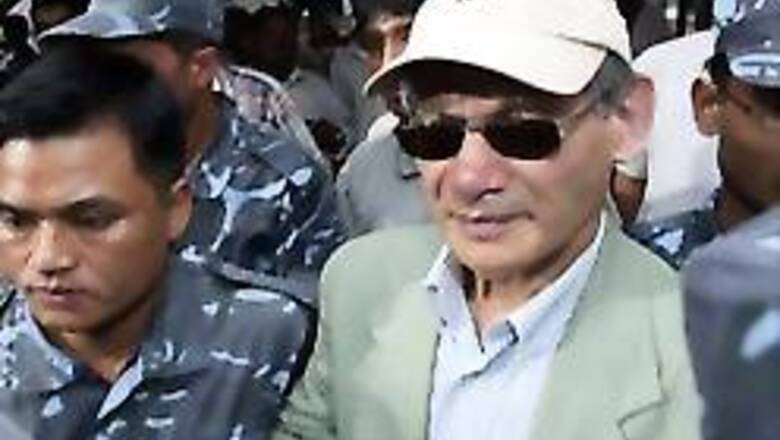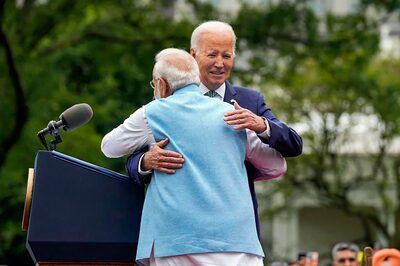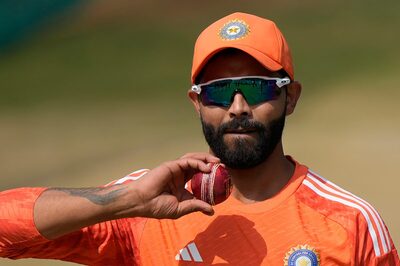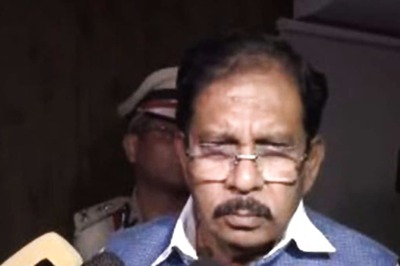
views
Kathmandu: Charles Sobhraj's hope of getting a verdict from Nepal's Supreme Court in a three-decade-old murder case were ruined with the apex court on Sunday once again putting off the announcement of the final verdict, the second time in less than a month.
Sobhraj, the mastermind behind a string of crimes in Asia in the 1970s, who was planning to walk out of the prison into a luxury hotel and soak himself in the bath for "two hours" if the court finally ended his four-year battle for freedom in Nepal, would now have to cool his heels in his high-security cell in Kathmandu's Central Jail till the next date for the verdict is announced.
According to local media reports, the verdict was put off as the daughter of one of the two judges who heard his final appeal is getting married Sunday.
Earlier this month, the decision was deferred once more on November 4 since one of the judges was out of station.
Since he was arrested from a Kathmandu casino in 2003 and charged with various crimes, Sobhraj's luck seems to have deserted him.
His Nepal trials have been marked by inordinate delays, sometimes due to clerical error, at times due to Nepal's long religious festivals and once due to a shutdown in Kathmandu and the imposition of daytime curfew.
Even the French Embassy, that is watching the case keenly as Sobhraj now holds French citizenship, has urged Nepal's government to speed up the trial.
The deferment means Sobhraj would also have to postpone his visit to the Sikh temple in nearby Lalitpur district to offer his thanks in a gesture that ties him to his Indian father by tradition.
The verdict of judges Anup Sharma and Top Bahadur Magar on Sunday was to have finally laid to rest a drama that began in 1975 with the discovery of the dead body of an American backpacker, Connie Jo Bronzich, on the way to the Kathmandu airport, and reached its climax in 2003 when Sobhraj was sighted in the city's tourist hub by a local daily.
PAGE_BREAK
The Himalayan Times daily published photographs of Sobhraj for several days, along with reports that relied on books written on Sobhraj by journalists, which Sobhraj dismisses as inaccurate.
The reports revived the memory of Bronzich's murder and led to police arresting Sobhraj from an upmarket casino in September 2003.
However, he was not charged with murder at first. Instead, police accused him of having visited Nepal in 1975 on a fake passport.
Though the district court dismissed the case, the police, most probably egged on by the tremendous publicity the case generated worldwide at Sobhraj's name, re-arrested him from the court premises and laid the fresh charge of murder.
The Bronzich case had rocked Nepal in the 1970s because soon after the discovery of the American's body, police also came across the corpse of a Canadian, Laurent Armand Carriere, who Bronzich had befriended during her Nepal trip.
Though police also suspected Sobhraj of being behind Carriere's murder, the case could not be re-opened for technical reasons.
Sobhraj, who himself submitted a written argument in Supreme Court in September after his lawyers had argued his case, says he never came to Nepal before 2003, was not found guilty of murder anywhere in the world and was convicted after an unfair trial in Nepal where the police did not have any evidence, did not call any witnesses for cross-examination and did not arrange for an interpreter.
What would have been an ordinary crime became the stuff Hollywood films are made of with the proceedings being joined by the man who was the investigating police officer in 1975.
Bishwo Lal Shrestha, who subsequently left the force and became a lawyer, was appointed, by a quirk of fate, by Bronzich's father to get justice for his slain daughter.
After the verdict, Sobhraj plans to publish his memoirs, chronicling his Nepal saga, while a French television company will make a new film on the ordeal.


















Comments
0 comment